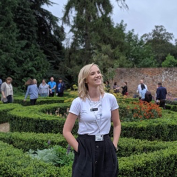Interventions Plus Projects
We are delighted to be funding six fantastic research projects looking at interventions to reduce loneliness and social isolation and promote mental health, ranging from community gardening initiatives to online songwriting workshops for people experiencing postnatal depression. We are very excited to see what they find and look forward to sharing their results with you.
Funded projects
PROJECT 1: Testing the success of an intervention to reduce loneliness and increase wellbeing for young people with mild to moderate mental health problems
| Principal Investigator |
|  |
|---|---|---|
| Lead Academic Institution |
University of Exeter | |
| Non-academic partners | Glasgow Association for Mental Health (GAMH) Follow on Twitter: @GAMH1977 / @Yuwei_Chua |
This research will evaluate GAMH’s community-based peer-group programme for young people with mental health difficulties. We will involve young people from the start, and use questionnaires, interviews, and focus groups, with young people who participate and who do not participate in the programme, as well as with GAMH workers. We expect to clarify how the programme reduces loneliness and benefits mental health recovery, as well as what encourages participation on this programme, particularly with respect to mental health difficulties and social disadvantage. This research will contribute to the evidence base for the development of services and activities that support young people’s mental health in the community.
PROJECT 2: What is the feasibility of prescribing community gardening to reduce loneliness and improve wellbeing in individuals with mental health problems?
| Principal Investigator | Follow on Twitter: @DrCarly_Wood |  |
|---|---|---|
| Lead Academic Institution |
University of Essex | |
| Non-academic partners | Follow on Twitter: @TrustLinksLtd |
This project will explore the impact of community gardening on loneliness and wellbeing in individuals with mental health problems; and the barriers and facilitators to use and prescription. Community gardening incorporates multiple health-promoting elements; however, evidence of its benefit and understanding of barriers to use, are essential for furthering its uptake. Adults attending Trust Links’ community gardens will be invited to complete up to three surveys, to assess changes in loneliness and wellbeing. Focus groups will also be held to understand the participants experience of the gardens; whilst Trust links staff, and staff operating referral services will take part in interviews to further explore the barriers to involvement, uptake and referral.
PROJECT 3:DANCE/CONNECT Applying the social cure approach: an exploration of whether online group dance can support the social and mental wellbeing of young people living with anxiety
| Principal Investigator | Follow on Twitter: @Katey_W Project Twitter: @Dance_Connect_ Project website: https://www.dance-connect.co.uk/ |  |
|---|---|---|
| Lead Academic Institution |
University College London | |
| Non-academic partners | Follow on Twitter: @DanceBase |
The aim of DANCE/CONNECT is to understand whether online dance classes can support young people (16-24) living with anxiety by providing them with an opportunity to feel a sense of belonging and identification to an online group. Adopting a mixed-methods approach, the project employs focus groups and participatory methods to work in partnership with young people to explore subjective experiences, as well as collects surveys to explore changes to measures of loneliness and mental health. This research is particularly important at this time as, due to COVID-19, young people with anxiety are at higher risk of loneliness and social withdrawal. You can keep up-to-date with the project via the project website and Twitter feed.
Read this blog by Katey for information about the project: https://www.ucl.ac.uk/psychiatry/pathways-plus-projects-blog-katey-warran
PROJECT 4: Songs from Home: Developing and testing an online songwriting intervention to tackle loneliness and enhance social connections in order to reduce symptoms of postnatal depression
| Principal Investigator | Follow on Twitter: @DrGeorgeWaddell |  |
|---|---|---|
| Lead Academic Institution | Royal College of Music | |
| Non-academic partners | Follow on Twitter: @HappityApp |
Feeling lonely increases the chance of mental illness among mothers. Low social support is a risk factor for postnatal depression (PND), an illness affecting up to one in eight women in the UK, and women with PND often feel lonely and socially isolated. Promisingly, previous research has shown that music interventions can enhance social connections and support recovery from PND. Songs from Home builds on this base to develop an online songwriting intervention, working with mothers to design and rigorously test a new digital programme with the aim of reducing loneliness in order to reduce symptoms of PND.
PROJECT 5: #KindnessByPost: a mixed methods investigation of an innovative participatory public health programme
| Principal Investigator | Follow on Twitter: @sheridan_rains |  |
|---|---|---|
| Lead Academic Institution |
University College London | |
| Non-academic partners | Partner organisation: Mental Health Collective Follow on Twitter: @MHC_UK |
#KindnessbyPost (KbP) is an initiative in which people send and receive messages of goodwill to a stranger by post. It is open to all but is particularly relevant to communities most affected by Covid-19, such as those with mental ill health, who are facing the challenge of loneliness and isolation more starkly than others. We will conduct an evaluation of KbP by exploring whether taking part improves participants’ wellbeing and if any benefits are sustained over time. We will also calculate the costs of the programme and develop a theory of how KbP works, for whom, and in what circumstances.
PROJECT 6: Loneliness, mental health and wellbeing: an acceptability and feasibility study of UK Men’s Shed.
| Principal Investigator | Follow on Twitter: @BryonySPorter |  |
|---|---|---|
| Lead Academic Institution |
University of East Anglia | |
| Non-academic partners | Follow on Twitter: @UKMensSheds |
Men’s Sheds are a community organisation that aims to reduce loneliness and isolation. Sheds are ‘making environments’ where men (and women) (Shedders), come together in a social space, doing practical activities (e.g. woodwork), sharing skills, developing friendships, and offering mutual support that can by default help with physical, mental and social aspects of health. Some are involved in social prescribing schemes. In this project we will understand how to measure the impact that being part of a Shed has on loneliness and mental wellbeing. We will conduct a survey and use follow-up interviews to gain a deeper understanding of Shedders experiences and the impact of social prescribing referrals on Sheds.
Pathways Plus Projects
We are proud to be funding six outstanding research projects looking at pathways between loneliness, social isolation and mental health in diverse contexts and populations, using a range of methods. We are very excited to see what they find and look forward to sharing their results with you.
PROJECT 1: Exploring the effects of loneliness and social isolation on experiences of recovery and relapse in Obsessive Compulsive Disorder
| Principal Investigator | Follow on Twitter: @josiefam |  |
|---|---|---|
| Lead Academic Institution | University of Bath | |
| Non-academic partners |
Obsessive Compulsive Disorder (OCD) is common mental health problem. Those who suffer spend many hours each day in the grip of relentless intrusive thoughts and the undertaking of compulsive behaviours, which can lead to social isolation and emotional loneliness. Cognitive Behavioural Therapy (CBT) for OCD is an effective treatment. However, up to 60% of people experience a relapse after CBT. This study will use in-depth interviews to find out about the relationship between loneliness and social isolation and the potential impact this has on OCD recovery and relapse. These findings will help us to inform future interventions aimed at preventing relapse.
Read this blog by Josie for information about the project: https://www.ucl.ac.uk/psychiatry/pathways-plus-projects-blog-josie-millar
PROJECT 2: Pathways between LGBTQ migration, social isolation and mental distress: The temporal-relational-spatial experiences of LGBTQ mental health service-users
| Principal Investigator | Follow on Twitter: @DrZoeBoden |  |
|---|---|---|
| Lead Academic Institution | University of Brighton | |
| Non-academic partners | MindOut - Follow on Twitter: @MindOutLGBTQ |
This project explores relationships between migration, social isolation, loneliness, and mental health for lesbian, gay, bisexual, trans and queer (LGBTQ) people. LGBTQ people often face discrimination and social exclusion, and have significantly poorer mental health. Many LGBTQ people migrate in search of safety, acceptance and community. A popular destination is Brighton, sometimes described as the UK’s ‘Gay Capital’. Collaborating with the LGBTQ mental health charity, MindOut, and drawing on insights from psychology and geography, the research team will invite LGBTQ people with lived experience to participate in interviews and draw maps of their spatial and relational experiences migrating to and living in Brighton.
PROJECT 3: Left on Read: Young people co-producing new ways of thinking and feeling loneliness
| Principal Investigator | Follow on Twitter: @dugganjr / @youthloneliness |  |
|---|---|---|
| Lead Academic Institution | Manchester Metropolitan University | |
| Non-academic partners | 42nd Street - Follow on Twitter: @42ndStreetmcr |
Left on Read is about co-producing creative encounters to help young people explore loneliness, isolation and mental health issues during COVID-19 lockdown/physical distancing. The project will support six young people from the mental health charity 42nd Street to develop creative and artistic encounters or experiments that other young people, their parents and families can stage in their homes, outdoor or online spaces according to the rules of lockdown. It is through these creative methods that the research team aims to develop new ways of thinking about loneliness that do not blame or stigmatise and create innovative ways of navigating experiences of loneliness.
Watch James talk about the process he went through to develop his application, what he is doing in his research project, and giving his top tips to other early career researchers thinking about applying for funding.
PROJECT 4: The relationship between loneliness, social isolation, depression and mother-infant bonding in the perinatal period: a collaborative, mixed methods study (aka Mums Alone: The Perinatal Loneliness Study)
| Principal Investigator | Dr Billie Lever-Taylor & Dr Angela Sweeney Follow on Twitter: @billie_lt |   |
|---|---|---|
| Lead Academic Institution | University College London |
Many women experience depression during pregnancy and in the first year after childbirth, known as the perinatal period. This can have serious consequences, including affecting women’s bond with their babies. Many women also find that their relationships and friendships change during and after pregnancy, which can make them feel lonely and isolated. However, there has been little research exploring how isolation connects to women’s depression and the bond with their babies. Also, little is known about how perinatal women describe loneliness and isolation in relation to their mental health. This project plans to use existing data to explore relationships between loneliness, isolation, depression and mother-infant bonding in a collaborative, mixed-methods study.
Taylor BL, Howard LM, Jackson K, Johnson S, Mantovani N, Nath S, Sokolova AY, Sweeney A. (2021) Mums Alone: Exploring the Role of Isolation and Loneliness in the Narratives of Women Diagnosed with Perinatal Depression. Journal of Clinical Medicine 10(11):2271. https://doi.org/10.3390/jcm10112271
Read this blog by Billie and Angie for information about the project: https://www.ucl.ac.uk/psychiatry/news/2021/nov/mums-alone
PROJECT 5: Investigating whether loneliness is a mechanism that leads to depressive symptoms in older adults who are lesbian, gay, bisexual or have chronic physical health problems
| Principal Investigator | Follow on Twitter: @GemmaLewis13 |  |
|---|---|---|
| Lead Academic Institution | University College London | |
| Non-academic partners | Stephen Lee from the Network Co-Production Group and Ben Thomas from Opening Doors London - Follow on Twitter: @stephen_13_lee, @BenT_DH & @OpeningDoorsLdn |
Certain older adults have a higher risk of depression, for example those who are lesbian, gay or bisexual (LGB) or have chronic physical health problems; but we have a poor understanding of what causes this increased risk. This project will investigate whether loneliness might explain the increased risk of depression in older adults who are LGB or have physical health problems. The research team will use the ELSA study, which has followed a representative sample of UK older adults since 2002, collecting data every two years for a 15-year period. This project could help inform evaluations of social interventions in people who are LGB or have physical health problems. Interventions addressing loneliness could improve depressive symptoms in these groups, if there is evidence that this is causal.
Read this blog by Gemma for information about the project: https://www.ucl.ac.uk/psychiatry/pathways-plus-projects-blog-gemma-lewis
PROJECT 6: Loneliness, social isolation and mental health in farming communities: An analysis of social and cultural factors
| Principal Investigator | Follow on Twitter: @CRPRExeter |  |
|---|---|---|
| Lead Academic Institution | University of Exeter | |
| Non-academic partners | The Farming Community Network - Follow on Twitter: @FCNcharity and the Farming Health Hub |
The farming community has a distinct social and cultural identity, and different needs to other parts of society. This research project seeks to understand how social isolation, loneliness and mental health problems are experienced and managed within this unique context. Using in-depth interviews across Devon and Cornwall, and working with The Farming Community Network and the Farming Health Hub, the research team invited farming family members to share their own stories of loneliness, social isolation and poor mental health. They explored how specific aspects of farm work, life and physical environment can lead to, and are in turn affected by, such experiences, and consider how effective support provision for this overlooked social group can best be expanded.
The team have now launched a new research report exploring feelings of isolation and loneliness in farming. The research involved in-depth interviews with 22 farmers (male and female) and 6 practitioners. The findings provide valuable insights into farmers’ experiences of loneliness and the related challenges they face. Importantly, the research highlights a wide range of recommendations to improve support for those in the farm community who may be experiencing loneliness, isolation and mental health issues. You can download a digital copy of the report here and watch a recording of the launch webinar here.
Read this blog by Professor Matt Lobley and Dr Rebecca Wheeler about the project: https://www.ucl.ac.uk/psychiatry/pathways-plus-projects-blog-matt-lobley
 Close
Close

